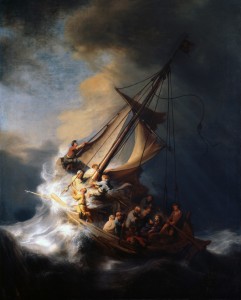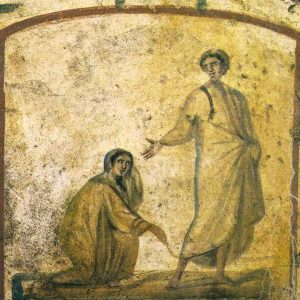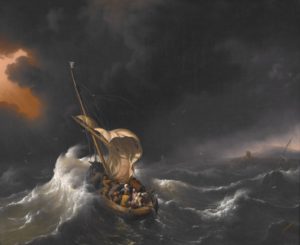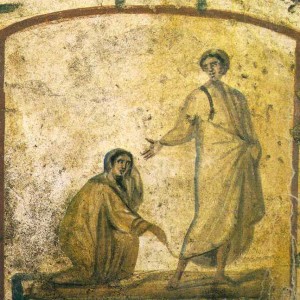Thoughts on Sunday’s Lessons for June 23, 2024 (Pentecost 5B/Proper 7)

The Storm on the Sea of Galilee (1633), oil painting on canvas by Rembrandt Harmenszoon van Rijn (1606-1669). National Gallery of Art, Washington, D.C. (Click image to enlarge.)
First Reading (Track One): 1 Samuel 17: (1a, 4-11, 19-23), 32-49 or 1 Samuel 17:57-18:5, 10-16
The Track One lectionary offers two options this Sunday: The familiar story of the battle between young David and the Philistine giant Goliath, or the less well-known narrative that follows it, telling of the ominous encounter between King Saul and David after Goliath was slain. Both narratives build toward David’s rise to become King, and jealous Saul’s inclination to kill David before he can assume the crown. We stay with Saul, David and Solomon through August, before our Hebrew Bible readings turn to an anthology of wisdom including Proverbs, Job, Esther and Ruth.
First Reading (Track Two): Job 38:1-7,34-41
Even in times of chaos and fear, God remains with us. Surely we are all familiar with the trials of Job. Tested by God at the urging of Satan (who in this context was more an adversary than a demonic spirit), Job retained his faith in spite of horrifying tests that would break even the strongest. Now, nearing the end of the book, Job finally gets his wish that God would come out of hiding and listen to him. But God, speaking out of a whirlwind with power and might, sets Job in his place with words like thunderbolts: “Where were you when I laid the foundation of the earth? Tell me, if you have understanding.” Job quickly repents; and at the end his fortunes are restored.
Psalm (Track One): Psalm 9:9-20 or Psalm 133
This passage from Psalm 9 is paired with the David and Goliath reading. Befitting the first reading’s warlike setting, the Psalm gives thanks to God who protects the people in time of trouble and oppression; who never forsakes those who seek protection in God’s name. Psalm 133, which we also read recently on the second Sunday after Easter, is to accompany the first reading about David and Saul. It celebrates the goodness and pleasure of living in unity, comparing this with the luxury of anointing with fine oil so abundantly that it runs down one’s hair and beard.
Psalm (Track Two): Psalm 107:1-3, 23-32
This beautiful hymn of praise to a God of mercy who protects us in peril sets a pitch-perfect tone for the following Gospel story about Jesus stilling the storm. The psalmist recalls a time when a violent storm at sea came upon some travelers whom God had redeemed. When they cried out to God, the storm gave way to calm. The travelers arrived safely on the shore, and we are called to join them in thanks and praise to a loving God who protects us from peril and delivers us from distress.
Second Reading: 2 Corinthians 6:1-13
The theme of this letter reflects Paul’s effort to reconcile and restore good relations after a period of trouble and anger in the church in Corinth. Paul tells them that he himself has suffered many things for following in Jesus’ way: beatings and prison, hunger and sleeplessness, riots and more. If he doesn’t mention storm and shipwreck, we know that Paul endured those trials, too. He urges the people to remember that God is with us through all difficulties. Open wide your hearts, he tells them, and accept God’s love.
Gospel: Mark 4:35-41
Jesus has been preaching to Jewish crowds on the shore of the Sea of Galilee, and now he leads the apostles across the broad lake to Gentile territory. Along the way we encounter one of those beloved Gospel stories that many of us remember from childhood. As children, though, we might have focused more on Jesus quieting the scary storm than on the apostles’ reactions. First, the fearful apostles fear that the calmly sleeping Jesus isn’t aware – or doesn’t care – that they are in deadly danger and scared out of their wits. Then, catching their breath when all is calm again, they seem shocked to discover that Jesus actually had the power that they had just called on him to use.



